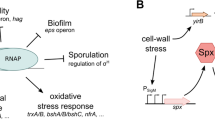Abstract
Shortly after the transition from exponential growth to stationary phase, the pattern of protein synthesis in Bacillus subtilis changes markedly. Among the most profoundly induced proteins are two homologous small acidic proteins, CspB and CspC, which are also major cold-shock-induced proteins. The third cold shock protein (CSP) in B. subtilis, CspD, is not induced following entry into stationary phase. Deletion of both cspB and cspC genes has been previously shown to lead to lysis of cells during stationary phase. These findings reveal that CSPs in B. subtilis are induced under several stress conditions, and that an increase in the synthesis of CspB and CspC is needed for efficient adaptation to stationary phase. Enhanced synthesis of CspB occurs through a combination of transcriptional and post-transcriptional activation, indicating a mechanism similar to that mediating cold shock induction of CSPs. Induction of CSPs in bacteria may be triggered by a common signal, the inactivation of ribosomes, occurring under both cold shock and stationary-phase conditions.
Similar content being viewed by others
Author information
Authors and Affiliations
Additional information
Received: 15 September 1998 / Accepted: 11 November 1998
Rights and permissions
About this article
Cite this article
Graumann, P., Marahiel, M. Cold shock proteins CspB and CspC are major stationary-phase-induced proteins in Bacillus subtilis. Arch Microbiol 171, 135–138 (1999). https://doi.org/10.1007/s002030050690
Issue Date:
DOI: https://doi.org/10.1007/s002030050690




